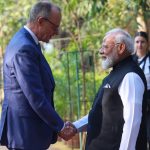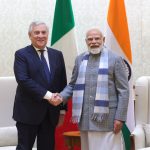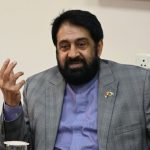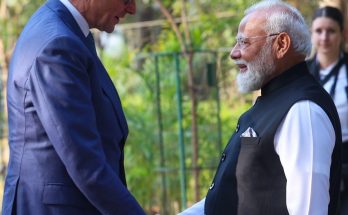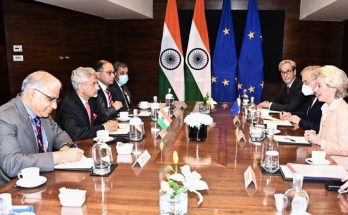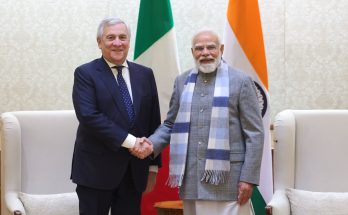 Amid concerns about strategic dissonance between India and the US over Afghanistan, Secretary of State John Kerry has allayed New Delhi’s anxieties over a power-sharing dialogue with the Taliban and batted vigorously for a proactive role for India in the 2014 Afghan elections.
Amid concerns about strategic dissonance between India and the US over Afghanistan, Secretary of State John Kerry has allayed New Delhi’s anxieties over a power-sharing dialogue with the Taliban and batted vigorously for a proactive role for India in the 2014 Afghan elections.
Talking to Taliban
“We will consult very closely with India and with others in the region,” Kerry said in response to a question by India Writes (www.indiawrites.org) on whether the Taliban reconciliation talks amounts to a dilution of the “red lines” endorsed by India and the international community.
Speaking at a joint media interaction with India’s External Affairs Minister Salman Khurshid, Kerry underlined that the Taliban, if they are to be part of any future Afghan dispensation, would have to “disassociate themselves from Al-Qaeda and from violence” and respect the constitutional protections for women and minorities. “That’s not going to change,” Kerry asserted. In the same breath, he added that it was still “better to explore the possibilities of having a peaceful resolution.”
Before flying to New Delhi on his maiden visit to India, Kerry had met some Taliban leaders in the Qatari capital Doha. The US’ move towards a dialogue with the Taliban had set off alarm bells ringing in New Delhi, which reacted sharply saying such a move should not amount to giving “equivalence between an internationally recognised government and insurgent groups.”
The hard-wing Taliban militia opened an office in Qatar last week and sought to position themselves as a parallel centre of authority in Afghanistan by using emblems of the former Taliban regime.
In an outreach to India, US diplomat James Dobbins, who has been asked to lead Taliban talks, would visit India June 27 after a stop in Kabul.
‘Only time will tell’
Salman Khurshid reacted in a guarded manner to the US’ reassurance, but voiced optimism that “they (the US) will ensure that none of the concerns of India are overlooked or undermined.” “I think it’s an experiment that is being done in order to find an alternative for sustainable peace in Afghanistan. One cannot disagree with that,” he said, adding: “It’s very clear what the objective is. How far that objective is possible, only time will tell.”
That last tentative qualifier – “only time will tell” – encapsulates a sense of deep unease in India about the play of the Taliban reconciliation process which New Delhi feels is conflicted and would encourage Pakistan, through its suspected Taliban-al Qaeda proxies, to shape the power-sharing deal to suit its own self-fashioned designs of strategic depth.
Kerry’s silence on whether the US will be amenable to talks with the Haqqani network – a powerful anti-India militant group suspected of having masterminded attacks on the Indian embassy and assets in Kabul – will only fuel anxieties among sections of India’s diplomatic-strategic establishment about the US’ mindfulness about India’s core security concerns in the region.
India ‘central’ to Afghan elections
But even allowing for different perceptions of self-interest by the world’s most powerful and populous democracies, what Kerry had to say about India’s role as a factor of stability and a key player in the 2014 Afghan elections should be reassuring to New Delhi.
India’s multifarious projects in the reconstruction and revival of Afghanistan, ranging from building roads, bridges and power stations to the Afghan parliament and dozens of transformative grassroots projects, need no endorsement from anyone. But surely it helps if they are acknowledged and reaffirmed. The chaotic sundown traffic on the streets Kabul, when ordinary Afghans just want to catch up with latest Indian family drama on TV or an odd Bollywood move, is without parallel. India has invested $2 billion in projects and in its own relationship with Afghanistan and President Hamid Karzai, said Kerry, while underlining a key role for India in helping Afghanistan have “accountable and transparent” elections.
In a speech in New Delhi hours after beginning his maiden visit to India June 23, Kerry had robustly backed India’s role in Afghanistan and underlined that the world’s largest democracy should assist the country in 2014 elections.
That Vision Thing
“India is a global partner in our effort to build stronger democracies throughout South Asia, as well as rules of the road across South-Central and East Asia, and a more peaceful and prosperous continent from the Caucasus to the coast of Japan,” Kerry said.
This projection of India as a key strategic partner of the US in the region could perhaps help in narrowing the perception gap over Afghanistan as the US readies to withdraw its troops from that country. One can only hope that the US is genuinely more accommodative of India’s concerns on Afghanistan in months to come if Washington’s larger strategy in the Asia-Pacific region has to be realised. The stakes in shaping an inclusive Asian architecture for both India and the US are much too high for any dissonance in other areas to deflect from this larger strategic objective. In the end, it’s about vision – which if traced to its etymology in Anglo-French and Old French means “something seen in the imagination” or “the act of seeing.” The vision is also linked etymologically to Sanskrit veda, which means to know. Going forward, it would mean more clear-seeing, imagination, backed by knowledge, in the India-US relations.
So, right now, fine-tuning the long-term vision for the India-US relations is imperative, in the root sense of the word. “The US and India have a very specific vision for peace and stability in Asia and the Asia-Pacific. We welcome the strong leadership India plays on the global stage,” said Kerry. Does India share this vision? Only Time Will Tell
Author Profile

- Manish Chand is Founder and Editor-in-Chief of India Writes Network (www.indiawrites.org) and India and World, a pioneering magazine focused on international affairs. He is CEO, Centre for Global India Insights, an India-based think tank focused on global affairs.
Latest entries
 India and the WorldJanuary 13, 2026India, Germany raise the bar for defence, economic ties
India and the WorldJanuary 13, 2026India, Germany raise the bar for defence, economic ties India and the WorldDecember 12, 2025India-Italy bonding: Tajani’s visit raises the bar for business, maritime ties
India and the WorldDecember 12, 2025India-Italy bonding: Tajani’s visit raises the bar for business, maritime ties In ConversationNovember 26, 2025G20 is a Force for global Good
In ConversationNovember 26, 2025G20 is a Force for global Good articlesNovember 26, 2025Rescuing G20 from North-South divide: Ubuntu Moment
articlesNovember 26, 2025Rescuing G20 from North-South divide: Ubuntu Moment

